 W
WColonel Max Hermann Bauer was a German General Staff officer and artillery expert in the First World War. As a protege of Erich Ludendorff he was placed in charge of the German Army's munition supply by the latter in 1916. In this role he played a leading role in the Hindenburg Programme and the High Command's political machinations. Later Bauer was a military and industrial adviser to the Republic of China under Chiang Kai-shek.
 W
WOskar Gustav Rudolf Berthold was a German flying ace of World War I. Between 1916 and 1918, he shot down 44 enemy planes—16 of them while flying one-handed. Berthold's perseverance, bravery, and willingness to return to combat while still wounded made him one of the most famous German pilots of World War I.
 W
WLeonardo Conti was the Reich Health Leader in Nazi Germany. The killing of many Germans who were of "unsound mind" is attributed to his leadership.
 W
WHeinrich Deubel was a German soldier, civil servant, World War I veteran and officer in the Schutzstaffel who served as commandant of Dachau concentration camp.
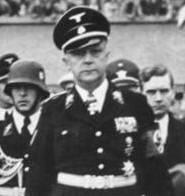 W
WFriedrich Karl Freiherr von Eberstein was a member of the German nobility, early member of the Nazi Party, the SA, and the SS. He was elected to the Reichstag and held the position of the chief of the Munich Police during the Nazi era. Eberstein was a witness at the Nuremberg Trials.
 W
WKurt Eggers was a German writer, poet, songwriter, and playwright with close links to the National Socialist German Workers' Party. He served as both a member of a propaganda company (Propagandakompanie) and as a Waffen-SS soldier at the rank of Mann in World War II, he was killed while serving in a tank regiment on the Eastern Front by the Red Army.
 W
WHermann Ehrhardt was a German Freikorps commander during the period of turmoil in Weimar Republic Germany from 1918 to 1920, he commanded the famous II.Marine Brigade, better known as the Ehrhardt Brigade or Marinebrigade Ehrhardt.
 W
WErnst-Robert Grawitz was a German physician and an SS functionary during the Nazi era.
 W
WEdmund Heines was a German Nazi politician and Deputy to Ernst Röhm, the Stabschef of the Sturmabteilung (SA). Heines was one of the earliest members of the Nazi Party and a leading member of the SA in Munich, participating in the Beer Hall Putsch and becoming a notorious enforcer of the party. He held several high-ranking positions in the Nazi administration until he was executed during the Night of the Long Knives in June 1934.
 W
WAugust Heißmeyer or Heissmeyer,, was a German SS functionary during the Nazi era. He commanded the SS Main Office in 1935–1939. After World War II, Heissmeyer was tried and convicted as a "major Nazi offender".
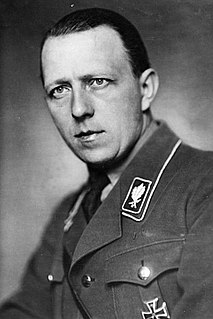 W
WWolf-Heinrich Julius Otto Bernhard Fritz Hermann Ferdinand Graf von Helldorff was an SA-Obergruppenfuhrer, German police official and politician. He served as a member of the Landtag of Prussia during the Weimar Republic, as a member of the Reichstag for the Nazi Party from 1933, and as Ordnungspolizei Police President in Potsdam and in Berlin. From 1938 he became involved with the anti-Nazi resistance, and was executed in 1944 for his role in the 20th July plot to overthrow Adolf Hitler's regime.
 W
WWerner Heyde was a German psychiatrist. He was one of the main organizers of Nazi Germany's T-4 Euthanasia Program.
 W
WWolfgang Kapp was a Prussian civil servant and journalist. He was a strict nationalist, and a failed leader of the so-called Kapp Putsch.
 W
WManfred Freiherr von Killinger was a German naval officer, Freikorps leader, military writer and Nazi politician. A veteran of World War I and member of the Marinebrigade Ehrhardt during the German Revolution, he took part in the military intervention against the Bavarian Soviet Republic. After the Freikorps was disbanded, the antisemitic Killinger was active in the Germanenorden and Organisation Consul, masterminding the murder of Matthias Erzberger. He was subsequently a National Socialist German Workers Party representative in the Reichstag and a leader of the Sturmabteilung, before serving as Saxony's Minister-President and playing a part in implementing Nazi policies at a local level.
 W
WPaul Emil von Lettow-Vorbeck, also called the Lion of Africa, was a general in the Imperial German Army and the commander of its forces in the German East Africa campaign. For four years, with a force of about 14,000, he held in check a much larger force of 300,000 British, Indian, Belgian, and Portuguese troops.
 W
WErich Friedrich Wilhelm Ludendorff was a German general, politician and military theorist. He achieved fame during World War I for his central role in the German victories at Liège and Tannenberg in 1914. Following his appointment as First Quartermaster-general of the Imperial Army's Great General Staff in 1916, he became the chief policymaker in a de facto military dictatorship that dominated Germany for the rest of the war. After Germany's defeat, he contributed significantly to the Nazis' rise to power.
 W
WWalther Karl Friedrich Ernst Emil Freiherr von Lüttwitz was a German general who fought in World War I. Lüttwitz is best known for being the driving force behind the Kapp–Lüttwitz Putsch of 1920 which attempted to replace the democratic government of the Weimar Republic with a military dictatorship.
 W
WRudolf Mentzel PhD was a German chemist and a National Socialist science policy-maker. An influential figure and one of the leading science administrators in Germany's nuclear energy project, Mentzel served as the scientific and technical adviser on the development of atomic bombs to the German government, and on some part, as the director of this program. Originally a National Socialist by political orientation, Mentzel served as one of the top leading science policy-makers to Adolf Hitler and his cabinet in his role as an undersecretary of the Reich Ministry of Education (REM) in the Office for Science. In the Kaiser Wilhelm Society, he was on the advisory board and, during World War II, Second Vice President of the Kaiser Wilhelm, supervising the clandestine research critical to develop the atomic bombs. During this period, his sphere of responsibility also momentarily grew and he soon was appointed as the president of the German Association for the Support and Advancement of Scientific Research, acting as the director of the nuclear program.
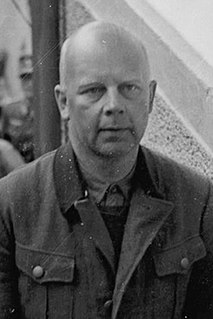 W
WCarl Oberg was a German SS functionary during the Nazi era. He served as the head of the SS and police (HSSPF) in occupied France during the Second World War and came to be known as the Butcher of Paris. Oberg deported over 40,000 Jews from France and had hundreds of hostages executed. Arrested by the Americans in the Tyrol in July 1945, he was twice sentenced to death by two different courts. However, in 1958 the death sentence was commuted to life imprisonment and later reduced to 20 years hard labour. Oberg was eventually pardoned and released on 28 November 1962.
 W
WErnst Julius Waldemar Pabst was a German soldier and political activist, involved in right-wing and anti-communist activity in both his homeland and Austria. As a serving officer Pabst gained notoriety for ordering the executions of Karl Liebknecht and Rosa Luxemburg in 1919 as well as for his leading role in the coterie of right-wing conspirators around Wolfgang Kapp. In Austria he played a central part in organising rightist militia groups before being deported due to his activities. Pabst subsequently faded from public life in Nazi Germany as he was never more than loosely associated with the Nazis.
 W
WFranz Pfeffer von Salomon during the Nazi regime known as Franz von Pfeffer, was the first Supreme Leader of the Sturmabteilung (SA) after its re-establishment in 1925. Pfeffer resigned from his SA command in 1930 and was expelled from the Nazi Party in 1941. He died in 1968.
 W
WKarl-Jesko Otto Robert von Puttkamer was a German admiral who was naval adjutant to Adolf Hitler during World War II.
 W
WLudwig Maximilian Erwin von Scheubner-Richter was a German political activist and an influential early member of the Nazi Party.
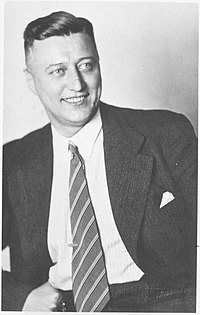 W
WKarl Eberhard Schöngarth was a German SS functionary during the Nazi era. He was a war criminal who perpetrated mass murder and genocide in German-occupied Poland during the Holocaust.
 W
WJakob Sporrenberg was an SS-Gruppenführer und Generalleutnant der Polizei in Minsk, Belarus and Lublin, Poland. After the war, Sporrenberg stood trial in Poland and was convicted in 1950 of war crimes and sentenced to death. He was executed in December 1952.
 W
WHermann Philipp Rudolf Stieve was a German physician, anatomist and histologist. Following his medical studies, he served in the German Army during First World War and became interested in the effect of stress and other environmental factors on the female reproductive system, the subject of his later research. In 1921 he became the youngest doctor to chair the medical department of a German university. He taught medicine at the University of Berlin, and was Director of the Berlin Institute of Anatomy at the Charité teaching hospital in the later years of his life.
 W
WBruno Streckenbach was a German SS functionary during the Nazi era. He was the head of Administration and Personnel Department of the Reich Security Main Office (RSHA). Streckenbach was responsible for many thousands of murders committed by Nazi mobile killing squads known as Einsatzgruppen.
 W
WIgnatius Timothy Trebitsch-Lincoln was a Hungarian adventurer and convicted con artist. Of Jewish descent, he spent parts of his life as a Protestant missionary, Anglican priest, British Member of Parliament for Darlington, German right-wing politician and spy, Nazi collaborator and Buddhist abbot in China.
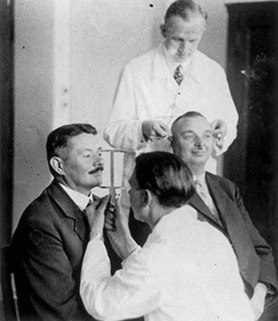 W
WOtmar Freiherr von Verschuer was a German human biologist, national socialist, and geneticist, who was the Professor of Human Genetics at the University of Münster until he retired in 1965. A member of the Dutch noble Verschuer family, his title Freiherr is often translated as baron.